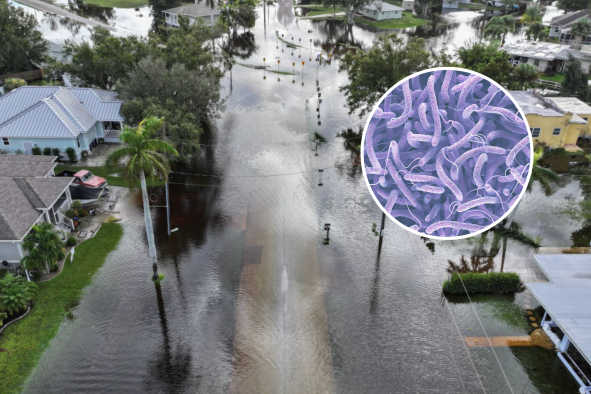Warehouses in Southern California have been linked with increased pollution in a study that used NASA satellites to map toxic particles in the air.
As warehouses were built over the last two decades to keep up with online shopping, air pollution rose too—particularly affecting low-income neighborhoods nearby.
Scientists identified diesel trucks visiting the warehouses as the source of the problem, because of contaminants emitted by their exhaust fumes as they visit to pick up and drop off goods.
Areas with more or larger warehouses in Los Angeles, Riverside, San Bernardino and Orange County were found to have higher levels of air pollution, compared to similar areas with fewer or smaller warehouses.
The pollution was significantly worse during the holiday season, the study found, when more trucks were needed to keep up with online gift-buying.
The toxic particles that were measured by NASA's satellites are called PM 2.5 and are so tiny—2.5 micrometers, or about ten-thousandth of an inch—that they can be inhaled and absorbed into the bloodstream easily.
Scientists say there is no safe exposure level to PM 2.5. This type of pollution has been linked to an increased risk of heart disease, lung disease, some cancers, and poor birth outcomes, such as babies being born prematurely or with low birth weights.
The scientists measured PM 2.5and elemental carbon—from 2000 until 2018, and 2019 respectively—and used data from a real estate database about the size of nearly 11,000 warehouses in the Southern California area, and the number of loading docks and parking spaces nearby them.
Southern California is a major distribution hub for goods in the U.S., handling 40 percent of cargo containers entering the country.
As online shopping has grown as an industry, more warehouses have been built to keep up with demand—often on inexpensive land, near disadvantaged populations.
That means that individuals with lower education levels, on lower incomes, and part of racial and ethnic minority groups, were found to be disproportionately affected by particulate pollution in these areas.
The study, published in GeoHealth, called for warehouse construction to be planned more carefully, to better protect vulnerable communities.
In another recent NASA-funded study that was published in Nature Communications, nitrogen dioxide gas was measured—a diesel byproduct that irritates the lungs—at around 150,000 warehouses in the U.S., finding that concentrations of this pollutant were about 20 percent higher near the structures.
Do you have a tip on a food story that Newsweek should be covering? Is there a pollution concern that's worrying you? Let us know via science@newsweek.com. We can ask experts for advice, and your story could be featured in Newsweek.
References
Yang, B., Zhu, Q., Wang, W., Zhu, Q., Zhang, D., Jin, Z., Prasad, P., Sowlat, M., Pakbin, P., Ahangar, F., Hasheminassab, S., & Liu, Y. (2024). Impact of Warehouse Expansion on Ambient PM2.5 and Elemental Carbon Levels in Southern California's Disadvantaged Communities: A Two-Decade Analysis. GeoHealth, 8(9). https://doi.org/10.1029/2024GH001091
Kerr, G. H., Meyer, M., Goldberg, D. L., Miller, J., & Anenberg, S. C. (2024). Air pollution impacts from warehousing in the United States uncovered with satellite data. Nature Communications, 15(1), 6006. https://doi.org/10.1038/s41467-024-50000-0
Disclaimer: The copyright of this article belongs to the original author. Reposting this article is solely for the purpose of information dissemination and does not constitute any investment advice. If there is any infringement, please contact us immediately. We will make corrections or deletions as necessary. Thank you.



